- Home
- Michael White
Jack Pendragon - 02 - Borgia Ring Page 3
Jack Pendragon - 02 - Borgia Ring Read online
Page 3
‘Don’t worry, I will,’ he said, and handed the cup back to Turner. ‘Dispose of this … please.’
Hughes smiled and perched on the corner of his desk. ‘So, what’ve we got?’
‘The man could have been killed just before he gate-crashed the rave, ma’am, and certainly no earlier than one-thirty according to Jones.’
‘But how on earth did he end up there?’
‘Sheer fluke. Inspector Grant interviewed the owner of The Love Shack. He’s being very co-operative, of course. A couple of my boys have been all over the house and the outbuilding. The club, if you want to call it that, was originally an air-raid shelter. It was extended in the seventies and used as a storeroom. A couple of years back, the owner was talked into converting it into a music venue. Got in some cowboys by the look of it … an old chimney has been widened and connected up as two air-vents. Whoever pushed the body into the opening on the roof probably thought it was a disposal chute. They could never have dreamt the corpse would end up in the middle of a packed dance-floor.’
‘So …’
‘So I’m heading over to Pathology, to see what Dr Jones has come up with.’ Pendragon was pulling on his jacket and following Hughes to the door. At the end of the corridor they could see Turner with two constables. The sergeant was doing a passable impersonation of Pendragon refusing the machine coffee. They were all wearing big grins. Turner glanced around, saw Pendragon and Hughes and immediately straightened up. The uniforms slipped away. Superintendent Hughes turned to Pendragon with a barely discernible smile. ‘Not a bad mimic really, is he?’
By 9.15 the streets were aglow with orange light. It was obvious the day was going to be another hot one. The thermometer hadn’t moved below 25 degrees all night and now it felt like a summer morning in the south of France. Even the usually grey surroundings of Mile End Road sparkled today. Amazing what a bit of sunshine could do, Pendragon thought as they pulled out of the station and turned on to the main road.
Turner drove and they sat in silence. Pendragon watched the sun-bleached shop fronts and the stained, graffiti-covered walls, metal garage shutters and broken guttering flash by. He thought how odd it all looked; as if London had suddenly been shifted a couple of thousand miles south. The strains of ‘Summertime’ played in his head. Traffic was light. Within a few minutes they were passing through a narrow entrance into a car park. A rectangular sign on the wall of a squat brick building read ‘Milward Street Pathology Unit’ under the Metropolitan Police crest, blue on white.
They found Dr Jones outside the front entrance. He was drawing hungrily on a cigarette, the ash falling into his fulsome beard. He barely reached Pendragon’s shoulder.
‘Banned from my own building,’ he said as the two policemen strode up to the doorway.
‘Quite right too,’ Pendragon responded. ‘Funny. I would have thought opening up corpses all day would have put you off the fags.’
Jones gave a dry laugh then coughed. ‘Fuck, Pendragon! It’s precisely because I cut open dead people that I don’t give a toss. You end up in a place like this either way. Come on, I’ve been here since before dawn with this one.’ He squashed the cigarette underfoot and shouldered open the door.
The pathology lab was like any other, anywhere. There were two rooms. The smaller one was the morgue. It was lined with steel drawers from floor to shoulder-height. The other had blinds at the windows, workbenches arranged in an L-shape along two walls, racks of test tubes and sundry pieces of chemical equipment. Two stainless-steel dissection tables with drain-off trenches and power hoses stood along the back wall. Between the tables were two trolleys. On top of these, a set of shiny steel dishes. Overhead, a stark fluorescent strip. The concrete floor was a scrubbed gun-metal grey. The whole place stank of cleaning agent and viscera.
Dr Neil Jones was pulling on latex gloves as he approached one of the dissection tables. The dead man lay on the table with his torso cut open. His head was raised slightly on a stabilising block. Pendragon noticed a card tied to the big toe of the victim’s left foot. The card was covered in spindly black writing. In one of the steel dishes beside the table lay a liver. In the other, the contents of the man’s stomach. Turner, notebook in hand, seemed fascinated by it all.
‘So, do you have anything for us?’ Pendragon asked, and kicked his sergeant lightly on the shin.
‘No ID. Male. Late-thirties. Indian, or perhaps Bangladeshi. Five-five and overweight. A heavy smoker by the look of his lungs.’ He nudged a mass of grey tissue with a scalpel. Pendragon looked away for a moment; he could never get used to the clinical dismissiveness of people like Jones.
‘Oh, please! Don’t tell me you’re squeamish, Chief Inspector?’ Jones chortled.
Pendragon ignored him and glared at Turner who had stopped scribbling. ‘Go on.’
‘You’ll notice extensive bruising … here and here … on the upper arms. Also, his jaw is fractured and his windpipe has been shattered.’ He pointed to the side of the man’s face and under his chin. The flesh was black and broken, split like torn leather. ‘He suffered two particularly vicious blows to the head. Either one would have killed him.’ Jones rolled the victim’s head to one side and they could see a large occlusion on the back of his skull. ‘Blunt-force trauma. Hit by a heavy object, here and under the chin – the blow that smashed his windpipe. I’ve measured the opening in the skull and would guess the weapon was cylindrical – a metal pipe or tubing; heavy-duty torch perhaps. There’s no blood under the fingernails, no hair or skin traces. But from the fractures and bruising, I would imagine there was definitely a struggle.’
Jones turned to another table close by and lifted up a boot. ‘Workboots, size seven, caked in mud. Shirt with a company name – Bridgeport Construction. Our man was obviously a labourer or at least working on a building site. Should help.’
Pendragon was about to reply when Turner’s phone rang. ‘Yep,’ he replied chirpily. ‘Yep, cool … ciao.’
Pendragon gave a heavy sigh and raised his eyebrows.
‘The station, sir. The murdered man is Amal Karim. Indian. Worked for Bridgeport Construction, who just happen to have a building site down the street from Jangles, on Frimley Way.’
‘Great.’
‘There’s more. Forensics have something they want you to see. Wouldn’t elaborate.’
The locus – the immediate vicinity in which the body was found – in The Love Shack – was abuzz with figures in green plastic suits, scene-of-crime officers from local forensics. Yellow police crime-scene tape had been stretched across the door leading down into the club from the short passageway alongside the shop, and as Pendragon pulled himself under it two SOCOs turned to see who had invaded their space. Neither of them knew Pendragon, but one of the investigators nodded to Turner as he followed the DCI under the tape.
A woman approached them. She was dressed in a regulation plastic suit over a shirt and jeans. ‘DCI Pendragon, I presume,’ she said. ‘Dr Colette Newman, Head of Forensics.’ Her voice was clipped, a hint of BBC circa 1960. Not something you heard much any more.
Pendragon started to put out his hand then withdrew it. Dr Newman smiled. She looked to be about thirty-five, he guessed: fine features, high cheekbones, huge blue eyes. She had to keep tucking strands of blonde fringe behind her right ear.
‘You have something for me?’ he said.
‘Yes. If you’d like to follow me.’
Dr Newman took them back out into the small enclosed concrete courtyard. Some stairs to one side led up to the roof of the club. It was flat and featureless with two metal flues rising about three feet above roof level. The cover of one of the flues had been removed. It lay on the floor a few metres away, a SOCO dusting the metal edge with a large floppy brush. Pendragon could see blood smeared across the bright metal.
‘We’ve found plenty to go on up here.’ She pointed to a large pool of congealed blood. It had dried at the edges and some had seeped into the concrete. A trail of mud and blood ended
at the flue and all around were flecks of red. ‘From a first look at the blood-spray pattern, I’d say the victim was hit at least twice.’
Pendragon nodded. ‘The pathologist said the same thing.’
‘I think the attacker came on to the roof from the stairs.’ She led the way to the edge of the roof and they looked down on to the courtyard they had just crossed. From here they could see into the neighbouring properties. To the right, three shops fronted the main road, each with flats above and small gardens behind. To the left stood a high wall. Just visible behind that stood a single, derelict property taking up the corner with Globe Road. Immediately behind Jangles, on the corner of Frimley Way, was a construction site.
‘So the murder took place up here?’ Turner said.
‘Definitely. Follow me.’
She took them back down the stairs, across the yard and through a gate. The alleyway beyond had been cordoned off. They could see a row of green council refuse bins, a dry mud path, brambles and weeds. A random line of red flags snaked its way through an opening ahead. The flags were numbered and had been stuck into the parched soil. In some of these locations they could see smears of blood, black against the mud. The opening led on to a narrow lane. At the end of this stood a tall mesh fence with barbed wire running along the top. A gate opened on to the construction site. It was unlocked, the chain and padlock hanging limp.
‘As you can see, we’ve found traces all along this path. Plenty of blood, hair, flakes of skin. But as it’s a building site, you’d expect at least the last two of these. No footprints, though, the ground is too hard. We’re still looking for fingerprints, but nothing so far.’
She picked a route across the hardened mud avoiding the flags and the ground close to them. A few steps on, they had reached the edge of a vast, roughly hewn pit criss-crossed with dirty planks supported by a framework of scaffolding. More red flags could be seen where the ground fell away. They followed her down a slope into the pit and along three planks, sidestepping more flags, until they reached the edge of a trench cut into the bottom of the pit. Piles of freshly turned earth lay all around. A cluster of flags had been stuck into the ground here.
Two SOCOs were hard at work. One was photographing the bottom of the trench; the other was on his knees, poking at the soil with a small trowel. The officer with the camera stopped work as they approached and Dr Newman stepped into his place, waving over Pendragon and Turner to see something.
The crouching figure straightened up and stepped aside as the Head of Forensics squatted down.
‘This is the beginning of the trail, DCI Pendragon. There are several signs of a struggle – crumbled soil and scrapes.’ She pointed to one side of the trench. ‘And then there’s this.’ Turning, she pointed to the ground.
They could see a small white object. Pendragon crouched down to take a closer look.
‘It’s a metatarsal, a finger bone, from the fourth or fifth on the right hand, I believe.’
The Venerable English College, Rome, January 1589
My name is Father John William Allen and my story begins in January, the Year of Our Lord, 1589.
History records many troubled eras. But for one such as I, a man of deep faith, these, I am sure, are times as bad as any in human reckoning. As I write, war rages between Catholics and Protestants, a war that has its roots in a schism created by the demon Luther and the Devil’s vassal, Henry VIII, over half a century ago.
Throughout Europe, men fight to uphold their vision of God. But the One True Faith, the faith of St Peter, the faith of Christ Himself, will, I know, prevail. Blood has been spilled, plenty of blood. But there is the blood of the faithful, and there is the blood of the heretic, and only the first of these is pure. Only the spilling of this blood is a sin.
I had been a student at the Venerable English College in Rome for five years, training to be a Jesuit missionary, when, late in May 1588, we received news from Paris that the good Catholic people of the city had risen up against that vile Protestant appeaser King Henri III. He fled and the governing of the city fell to a group of noblemen, the Council of Sixteen. Within days that great French Catholic the Duc de Guise was welcomed back into Paris from exile.
For a time there was peace there; indeed, Europe enjoyed a calm not experienced for many long years. Then, a few days after Christmas, news reached us that, on 23 December, the Duc de Guise and his brother, Cardinal de Guise, had been tricked by the treacherous Henri and slaughtered by the King’s henchmen – stabbed through the heart in the council chambers of the Château de Blois, where they had been summoned to a meeting.
When I heard this news I knew immediately that my time had come, that I would soon be rewarded for my devotions and offered the chance of martyrdom. For five years I had been imbued with the teachings of the One True Faith and been taught how to teach in my turn, trained to express my heartfelt and soul-deep zeal, so as to convert the waverers and restore stray Catholics to the fold. I was ready.
I remember the gathering in the great chamber of the college at which the head of my order, Superior General Acquaviva, addressed us all and imparted the news of My Lord Guise’s murder. I remember the hush, the stillness, and how I could feel anger and the bitterness all around me, actually taste these things in my mouth.
That night any true rest evaded me, and when I did tumble into the oblivion of sleep I could not be sure I was dreaming or simply remembering. For in the dark hours before the dawn unspeakable shadows haunted the corners of my cell and I could no longer separate dreams from the waking world.
The same images kept returning to torment me. Tyburn Village, to the west of London. A windswept, rain-drenched morning in April five years earlier. The execution of a Jesuit missionary, Henry Wittingham.
It began with a commotion from the crowd seated in the wooden stands to one side of Tyburn Tree, the three-poster gallows that had been a place of death for so many men and women over the years. The crowd murmurs, and then, as the cart comes into view, some of them begin to cheer and shout. The procession enters the square with the prisoner bound to a hurdle, naked but for a blood-stained loincloth. His face scrapes along the ground. As he is lifted from the dirt, the crowd can see Wittingham’s bloodied, swollen and blackened face. Gusts of rain sweep the scene. The executioner helps the condemned man stand upright on the cart parked beneath the scaffold. A noose is placed over the man’s head and the cart quickly drawn away.
He dangles and kicks. The crowd scream with excitement. A woman and two men run out to tug at Wittingham’s legs, trying to speed his end, but they are quickly spotted and dragged away by four burly wardens. The gasping man is cut loose and lowered to the ground. Then he is carried to a wooden platform where he is bound at wrist and ankle.
A hush. Even the sounds of Nature seem to recede; the wind drops, the rain slows. The prisoner’s face is awash with watery blood, his mouth agape. Most of his teeth are smashed. A gag is knotted across his open mouth and the loincloth yanked away and tossed into the mud below the platform. The executioner grabs Wittingham’s genitals and, with a single slice, castrates him. Blood fountains into the air, drenching the executioner’s leather jerkin. Wittingham’s body spasms, his back arches, and even through the gag, his screams sound like metal grinding against metal. Tossing the severed flesh into a basket, the executioner bends forward, grabs Wittingham’s hair for leverage and draws his blade the length of the man’s naked torso.
Wittingham has stopped moving, paralysed by shock. But he is still alive. The executioner reaches into the gaping hole and removes a handful of slimy, grey viscera. He tugs and cuts, holding aloft lengths of intestine before tossing them into the basket. Then he sets to work removing the prisoner’s heart. He cuts around the organ and severs arteries and veins. Only the executioner can tell when the heart has stopped beating. The prisoner’s legs and arms still twitch as the vital organ is raised into the air. The executioner adds it to the growing pile of flesh in the tumbril. The leaden silence all around i
s broken only by the flapping of wings as a crow lands on the edge of the basket and hungrily eyes the grey and red tangle of human remains.
A voice enquired: ‘Father John?’ There was a knock at the door. ‘Father John? The Superior General wishes to see you.’
My eyes snapped open and the horrors of the night vanished. I was once more in my tiny stone-walled room. The voice, Brother Giovanni’s, was coming from the other side of an oak door a few feet beyond the end of my narrow bed. I leapt up and strode over to it, feeling a tight knot of excitement in the pit of my stomach.
Giovanni was holding a candle. Its flame flickered wildly in the draught and cast streaks of light and dark across his benign, round face. The priest turned and I followed him. The passageway was black apart from the puddle of light cast by the bare candle but, of course, after five years at the college, I knew my way well. And in the dark, walking behind the good Father Giovanni, I finally shook myself awake, aware now that my dream had not been mere fancy, but a memory. What I had witnessed in the rain of Tyburn had led me here, to this moment. I had seen for myself how the Royal Whore, Elizabeth, treated her citizens. That experience had been the turning point which called me to Rome and the great cause. But, when I left England, I had turned my back on many things. My family in Suffolk were good Catholics, but they had never been militant. They had naively wished for nothing but peace between all faiths. In coming here to Rome, I had been forced to sever all family ties. I would never see my parents or my two younger brothers again.
The corridor opened on to a wide hallway. Father Giovanni extinguished the candle and placed it on a shelf, then beckoned me to follow him. The corridor was wide and carpeted, a red strip of expensive wool laid over white marble. Huge portraits hung on the walls, a succession of Popes dating back many centuries. Through the windows, I could see it was still dark outside. The place was enveloped in a silence so absolute I could hear my own breathing. At the end of the passageway were double doors of heavy oak. Guards in Vatican livery stood to either side of them. They stared ahead, ignoring us as Father Giovanni rapped on the oak. The doors swung open.

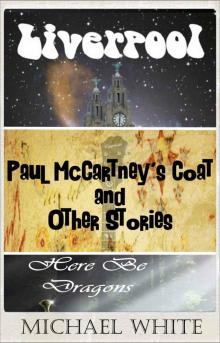 Paul McCartney's Coat
Paul McCartney's Coat The Cat Is Back!
The Cat Is Back!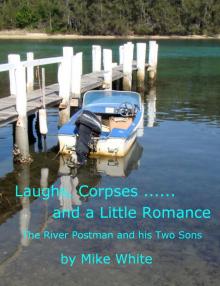 Laughs, Corpses... and a Little Romance
Laughs, Corpses... and a Little Romance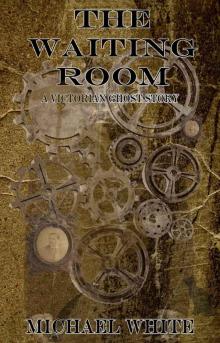 The Waiting Room
The Waiting Room Into the Light- Lost in Translation
Into the Light- Lost in Translation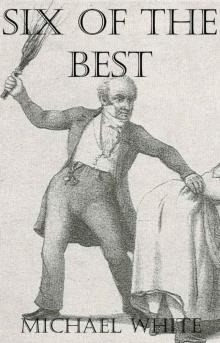 Six of the Best
Six of the Best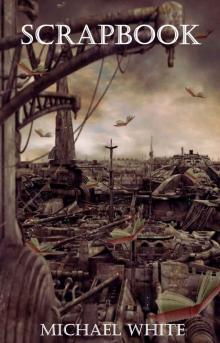 Scrapbook
Scrapbook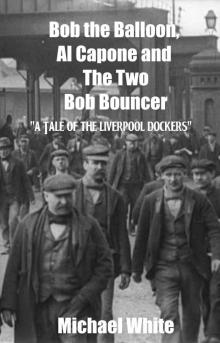 Bob the Balloon, Al Capone and the Two Bob Bouncer
Bob the Balloon, Al Capone and the Two Bob Bouncer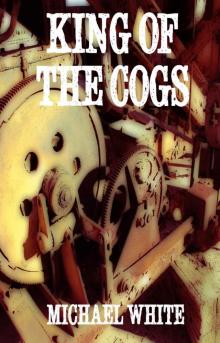 The King of the Cogs
The King of the Cogs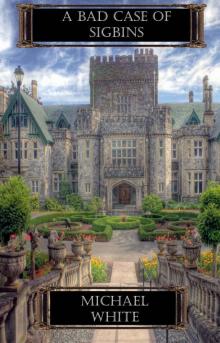 A Bad Case of Sigbins
A Bad Case of Sigbins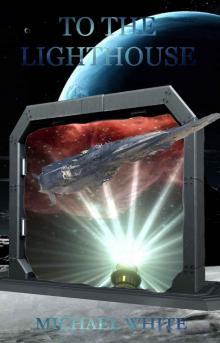 To the Lighthouse
To the Lighthouse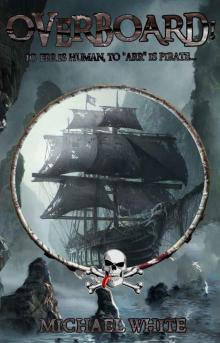 Overboard!
Overboard!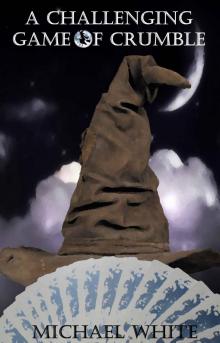 A Challenging Game of Crumble
A Challenging Game of Crumble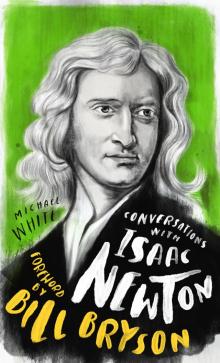 Conversations With Isaac Newton
Conversations With Isaac Newton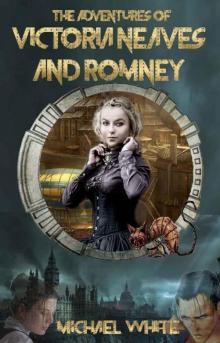 The Complete Adventures of Victoria Neaves & Romney
The Complete Adventures of Victoria Neaves & Romney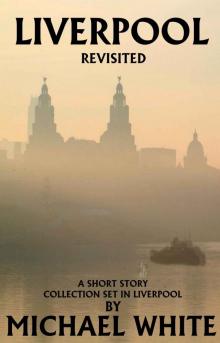 Liverpool Revisited
Liverpool Revisited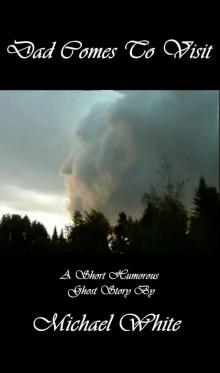 Dad Comes to Visit
Dad Comes to Visit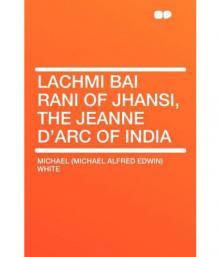 Lachmi Bai, Rani of Jhansi: The Jeanne D'Arc of India
Lachmi Bai, Rani of Jhansi: The Jeanne D'Arc of India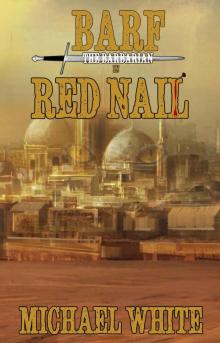 Barf the Barbarian in Red Nail (The Chronicles of Barf the Barbarian Book 2)
Barf the Barbarian in Red Nail (The Chronicles of Barf the Barbarian Book 2)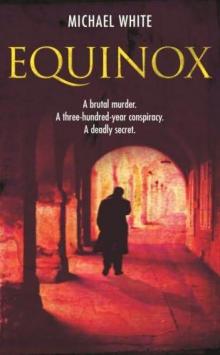 Equinox
Equinox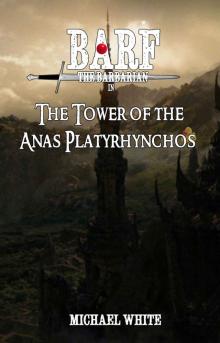 Barf the Barbarian in The Tower of the Anas Platyrhynchos (The Chronicles of Barf the Barbarian Book 1)
Barf the Barbarian in The Tower of the Anas Platyrhynchos (The Chronicles of Barf the Barbarian Book 1)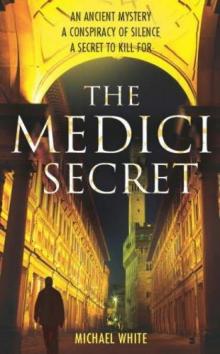 The Medici secret
The Medici secret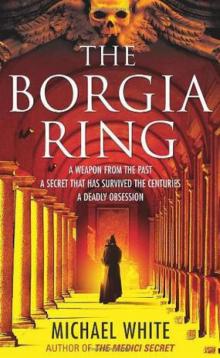 Jack Pendragon - 02 - Borgia Ring
Jack Pendragon - 02 - Borgia Ring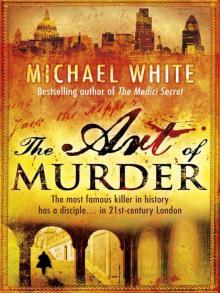 The Art of Murder jp-3
The Art of Murder jp-3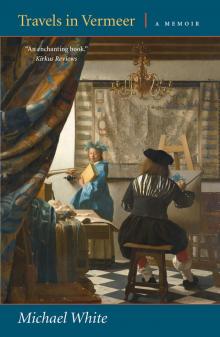 Travels in Vermeer
Travels in Vermeer